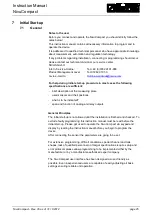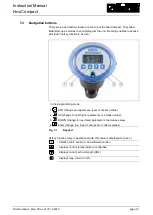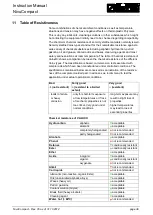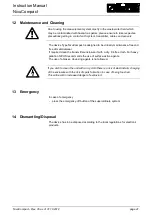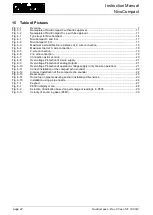
Instruction Manual
NivuCompact
®
NivuCompact - Rev. 05 as of 31.10.2012
page 39
11 Table of Resistiveness
Some combinations of chemical ambient conditions as well as temperature
situations and tension may have negative effects on thermoplastic Polymers.
This is why any lubricants, cleansing solutions or other substances which might
be contacting the equipment initially need to be checked regarding compatibility.
The short-term chemical resistance of semi-crystalline materials normally is well.
Semi-crystalline Valox types stand out for their remarkable resistance against a
wide variety of chemical substances including aliphatic hydrocarbon, petrol /
gasoline, oil and grease, diluted acids and bases, clean-sing agents and most
watery saline solutions at room temperature. The table >Chemical resistance of
Valox®< shows a comparison between the chemical resistance of the different
Valox types. The classification is based on immer-sion tests executed with
sample rods which have been manufactured under controlled conditions. The
specifications mentioned below are conceived as an indication of the resistive-
ness of the complete moulded part. In all cases we recommend to test the
application under actual operational conditions.
Bad
(not resistant)
Fairly good
(resistant to a limited
extent)
Very good
(resistant)
-
leads to failure
or heavy
corrosion
-
only for short-term exposure
at low temperatures or if loss
of mechanic properties is not
too critical. Very good under
normal conditions.
-
long-term exposure may
result in slight loss of
properties
-
higher temperatures
may lead to loss of
essential properties
Chemical resistance of VALOX®
Hydrocarbon
aliphatic
acceptable
aromatic
acceptable
completely halogenated
not recommended
partly halogenated
not recommended
Alcohols
acceptable
Phenol
not recommended
Ketones
conditionally resistant
Ester
conditionally resistant
Ether
acceptable
Acids
inorganic
acceptable
organic
conditionally resistant
oxygenate
not recommended
Alkali
not recommended
Car liquids
not recommended
lubricants (non-reactive, organic Ester)
acceptable
Oils (unsaturated aliphatic alloys)
acceptable
Waxes (heavy oil)
acceptable
Petrol / gasoline
acceptable
Coolant solution (Glycol)
acceptable
Break fluid (heavy alcohols)
acceptable
Cleaning agent
acceptable
Water, hot (> 80°C)
not recommended

